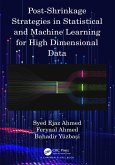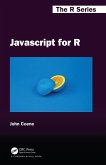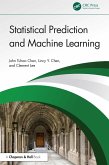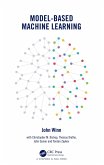Handbook of Sharing Confidential Data (eBook, PDF)
Differential Privacy, Secure Multiparty Computation, and Synthetic Data
Redaktion: Drechsler, Jörg; Slavkovic, Aleksandra; Reiter, Jerome; Kifer, Daniel
52,95 €
52,95 €
inkl. MwSt.
Sofort per Download lieferbar

26 °P sammeln
52,95 €
Als Download kaufen

52,95 €
inkl. MwSt.
Sofort per Download lieferbar

26 °P sammeln
Jetzt verschenken
Alle Infos zum eBook verschenken
52,95 €
inkl. MwSt.
Sofort per Download lieferbar
Alle Infos zum eBook verschenken

26 °P sammeln
Handbook of Sharing Confidential Data (eBook, PDF)
Differential Privacy, Secure Multiparty Computation, and Synthetic Data
Redaktion: Drechsler, Jörg; Slavkovic, Aleksandra; Reiter, Jerome; Kifer, Daniel
- Format: PDF
- Merkliste
- Auf die Merkliste
- Bewerten Bewerten
- Teilen
- Produkt teilen
- Produkterinnerung
- Produkterinnerung

Bitte loggen Sie sich zunächst in Ihr Kundenkonto ein oder registrieren Sie sich bei
bücher.de, um das eBook-Abo tolino select nutzen zu können.
Hier können Sie sich einloggen
Hier können Sie sich einloggen
Sie sind bereits eingeloggt. Klicken Sie auf 2. tolino select Abo, um fortzufahren.

Bitte loggen Sie sich zunächst in Ihr Kundenkonto ein oder registrieren Sie sich bei bücher.de, um das eBook-Abo tolino select nutzen zu können.
he Handbook of Sharing Confidential Data helps data stewards understand how tools from the data confidentiality literature-specifically, synthetic data, formal privacy, and secure computation-can be used to manage trade-offs in disclosure risk and data usefulness.
- Geräte: PC
- mit Kopierschutz
- eBook Hilfe
Andere Kunden interessierten sich auch für
![Handbook of Sharing Confidential Data (eBook, ePUB) Handbook of Sharing Confidential Data (eBook, ePUB)]() Handbook of Sharing Confidential Data (eBook, ePUB)52,95 €
Handbook of Sharing Confidential Data (eBook, ePUB)52,95 €![Machine Learning for Knowledge Discovery with R (eBook, PDF) Machine Learning for Knowledge Discovery with R (eBook, PDF)]() Kao-Tai TsaiMachine Learning for Knowledge Discovery with R (eBook, PDF)48,95 €
Kao-Tai TsaiMachine Learning for Knowledge Discovery with R (eBook, PDF)48,95 €![Post-Shrinkage Strategies in Statistical and Machine Learning for High Dimensional Data (eBook, PDF) Post-Shrinkage Strategies in Statistical and Machine Learning for High Dimensional Data (eBook, PDF)]() Syed Ejaz AhmedPost-Shrinkage Strategies in Statistical and Machine Learning for High Dimensional Data (eBook, PDF)52,95 €
Syed Ejaz AhmedPost-Shrinkage Strategies in Statistical and Machine Learning for High Dimensional Data (eBook, PDF)52,95 €![Geographic Data Science with R (eBook, PDF) Geographic Data Science with R (eBook, PDF)]() Michael C. WimberlyGeographic Data Science with R (eBook, PDF)52,95 €
Michael C. WimberlyGeographic Data Science with R (eBook, PDF)52,95 €![Javascript for R (eBook, PDF) Javascript for R (eBook, PDF)]() John CoeneJavascript for R (eBook, PDF)52,95 €
John CoeneJavascript for R (eBook, PDF)52,95 €![Statistical Prediction and Machine Learning (eBook, PDF) Statistical Prediction and Machine Learning (eBook, PDF)]() John Tuhao ChenStatistical Prediction and Machine Learning (eBook, PDF)85,95 €
John Tuhao ChenStatistical Prediction and Machine Learning (eBook, PDF)85,95 €![Model-Based Machine Learning (eBook, PDF) Model-Based Machine Learning (eBook, PDF)]() John WinnModel-Based Machine Learning (eBook, PDF)75,95 €
John WinnModel-Based Machine Learning (eBook, PDF)75,95 €-
-
-
he Handbook of Sharing Confidential Data helps data stewards understand how tools from the data confidentiality literature-specifically, synthetic data, formal privacy, and secure computation-can be used to manage trade-offs in disclosure risk and data usefulness.
Dieser Download kann aus rechtlichen Gründen nur mit Rechnungsadresse in A, B, BG, CY, CZ, D, DK, EW, E, FIN, F, GR, HR, H, IRL, I, LT, L, LR, M, NL, PL, P, R, S, SLO, SK ausgeliefert werden.
Produktdetails
- Produktdetails
- Verlag: Taylor & Francis eBooks
- Seitenzahl: 342
- Erscheinungstermin: 9. Oktober 2024
- Englisch
- ISBN-13: 9781040118702
- Artikelnr.: 72273908
- Verlag: Taylor & Francis eBooks
- Seitenzahl: 342
- Erscheinungstermin: 9. Oktober 2024
- Englisch
- ISBN-13: 9781040118702
- Artikelnr.: 72273908
- Herstellerkennzeichnung Die Herstellerinformationen sind derzeit nicht verfügbar.
Jörg Drechsler is Head of the Department for Statistical Methods at the Institute for Employment Research in Nuremberg, Germany, and Professor of Statistical Science at the Institute for Statistics at the Ludwig-Maximilians-University in Munich. He is also Associate Research Professor in the Joint Program in Survey Methodology at the University of Maryland. His main research interests are data confidentiality and nonresponse in surveys. He is a fellow of the International Statistical Institute. He received his PhD in Social Science from the University of Bamberg and his Habilitation in Statistics from the Ludwig-Maximilians-Universität in Munich. Daniel Kifer is Professor of Computer Science at Penn State University. He has published extensively on technical approaches for privacy and confidentiality, with work spanning attack algorithms, novel methods for disclosure avoidance, statistical analysis of perturbed data, and automated tools for catching implementation errors. In 2016-2017, Kifer spent his sabbatical at the U.S. Census Bureau and helped design the disclosure avoidance system used for the 2020 Decennial Census. Kifer obtained his bachelor's degrees in mathematics and computer science at New York University and his PhD at Cornell. Jerome Reiter is Professor of Statistical Science at Duke University. His primary research areas include methods for protecting data confidentiality, for handling missing values, and for integrating data across multiple sources. He has worked extensively on theory, methods, and applications for synthetic data. He is Fellow of the Institute of Mathematical Statistics and the American Statistical Association. He received a PhD in statistics from Harvard University and his undergraduate degree from Duke University. Aleksandra Slavkovic is Professor of Statistics & Public Health Sciences, Dorothy Foehr Huck and J.Lloyd Huck Chair in Data Privacy and Confidentiality, and Associate Dean for Research, Eberly College of Science at Penn State. Her research focuses on methodological developments in the area of data privacy and confidentiality in the context of small- and large-scale surveys, health, genomic, and network data, including work on differential privacy and broad data access that offers guarantees of accurate statistical inference needed to support reliable science and policy. She is Fellow of the American Statistical Association, the Institute of Mathematical Statistics, and the International Statistical Institute. She received her PhD (2004) and MS (2001) in statistics and Master of Human-Computer Interaction (1999) from Carnegie Mellon University. She received her BA in psychologyfrom Duquesne University (1996).
1. Introduction Part 1. The Big Picture 2. Protecting Confidential Data through Non-Statistical Methods 3. 21st Century Statistical Disclosure Limitation: Motivations and Challenges Part 2. Formal Privacy Techniques 4. Review of Popular Algorithms for Differential Privacy 5. Privacy Implications of Practical Model Design Choices 6. Query answering for tabular data 7. Machine learning with differential privacy 8. Statistical Inference and Differential Privacy 9. Systems Issues in Formally Private Systems Part 3. Synthetic Data 10. Synthetic Data 11. Methods for Synthetic Data Generation 12. Validation Services for Confidential Data Part 4. Secure Multiparty Computation 13. Privacy-Preserving Distributed Computation 14. Differential Privacy and Cryptography 15. Overview of Secure Multi-Party Computation Applications in Health Research and Social Sciences Part 5. Use Cases 16. Differential Privacy Implementations 17. Synthpop a tool to enable more flexible use of sensitive data within the Scottish Longitudinal Study 18. Safe Data Technologies: Safely Expanding Access to Administrative Tax Data 19. Secure Federated Learning: Integrated Statistical Modeling for Healthcare Applications
1. Introduction Part 1. The Big Picture 2. Protecting Confidential Data through Non-Statistical Methods 3. 21st Century Statistical Disclosure Limitation: Motivations and Challenges Part 2. Formal Privacy Techniques 4. Review of Popular Algorithms for Differential Privacy 5. Privacy Implications of Practical Model Design Choices 6. Query answering for tabular data 7. Machine learning with differential privacy 8. Statistical Inference and Differential Privacy 9. Systems Issues in Formally Private Systems Part 3. Synthetic Data 10. Synthetic Data 11. Methods for Synthetic Data Generation 12. Validation Services for Confidential Data Part 4. Secure Multiparty Computation 13. Privacy-Preserving Distributed Computation 14. Differential Privacy and Cryptography 15. Overview of Secure Multi-Party Computation Applications in Health Research and Social Sciences Part 5. Use Cases 16. Differential Privacy Implementations 17. Synthpop a tool to enable more flexible use of sensitive data within the Scottish Longitudinal Study 18. Safe Data Technologies: Safely Expanding Access to Administrative Tax Data 19. Secure Federated Learning: Integrated Statistical Modeling for Healthcare Applications







